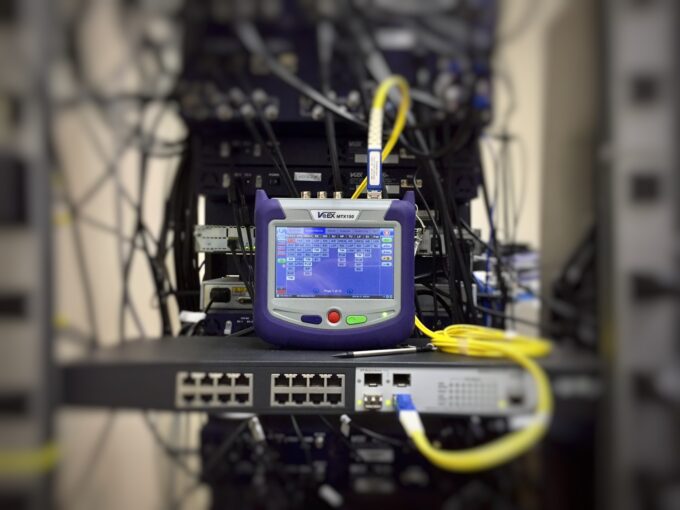Any chance you get to upgrade or improve your business should be taken advantage of, especially if you want to best for your company. Compiling your voice and data networks is just one of the many things you could do to bring your company into this communication-driven modern age.
Better communication between employees and clients is always going to produce a better workflow. Many are choosing to switch to a Voice over Internet Protocol (VoIP) service. This is a phone system technology that can be on-premise or off-premise and is a more recent development in the private branch exchange (PBX) telephony industry. PBX is not connected to a data network, but VoIP is.
Why Switch To Voice And Data Technology?

Bringing these two elements together is ultimately going to save you in the long run, when it comes to the focus, organization, and communication within your business. The advantages of combining voice and data on the same network are becoming more feasible for even smaller businesses as the technology is ever-growing, leaving the door wide open for more accessibility for different kinds of companies in different locations. As the digital world grows, along with this comes the telecommunication world—if one changes it only makes sense that the other should follow suit. Essentially this is why VoIP exists.
If you are looking for solutions that will work for you and your business you can visit this site for a comprehensive list of voice and data technology solutions, from headsets and mobiles to data networking switches.
If you’re still not sure about what you could be gaining from making the switch, let’s go through 5 ways you can benefit from integrated voice and data technology solutions.
1. Cost
Most of the time in business, bundling means cost savings. This is usually a bulk discount for clients who buy more than one service in any field and the telecommunication industry is no exception.

Most businesses can save a significant amount of money if they purchase their data and phone service from the same provider, consolidating their voice and data network. These savings can be much higher if you’re switching between a traditional phone service to a VoIP.
Bundling your voice and data into one service from one provider can also offer savings with IT staffing and flexible billing, and you can spend less time and money on factors such as productivity and improved reliability.
2. One bill
Receiving your business phone bill shouldn’t be as complicated and as hard to understand as it can sometimes be. If you’re struggling with the strange regulations and calculations of the providers that you’re currently using for your phone and internet networks, then bringing it all together can help consolidate this into one easy bill.

Switching to a good provider who’s going to show transparency and honesty in their services is also going to give you the advantage of knowing what you’re paying for.
Providers such as Grandstream and NEC offer physical products for communication needs and digital and networking solutions for voice and data. Using a provider such as these easily consolidates all your telecommunications and data needs for your business.
3. Better customer service
Using a system such as VoIP can make it much easier for employees to communicate with each other internally and for them to communicate and deliver better services to customers.

An example of this would be for service centers that are using voice and data technology solutions where they can have customer history and other important data come up automatically when a customer calls in. This saves time and can allow for your service team to help the client as best they can and with all the available data there and ready to be used.
4. Moves/adds/changes
You don’t have to stay at the same phone or location to use a system such as VoIP. You can plug in your headset anywhere there’s an outlet available and connect/login to the service to call clients and other employees. You can move office stations, home office areas, and more and still have access to your voice and data network.

You don’t have to wait to be assigned a new telephone number or for a technician to set anything up for you, such as any hardware changes. You simply are able to access all you need on your own. This makes remote work much easier and more accessible for many different kinds of companies.
As many businesses have been made to reconsider their remote working options for their employees over the last year, a voice and data network that they can access from anywhere is indispensable.
5. One place for support/services
When something goes wrong with your phone service, there’s surely a number you have to call. You’re left on hold for hours and you spend more time than necessary on resolving the problem that could have been fixed in a matter of minutes.

Sometimes problems can arise when your different services/providers update their systems. With your voice and data networks separate, if something goes wrong with one, likely the other may be affected and you are left with the task of dealing with two separate companies to solve one problem.
With these two systems integrated, however, when updates are made, they are both updated together and you can avoid the stressful runaround between two vendors. When you need expansions, upgrades, or improvements, there’s only one network you have to deal with.
Dealing with separate vendors can be a nightmare, especially if they work by different standards or levels. Even if voice and data technology solutions have their problems, there’s still only one place you have to go to solve any issues. This makes troubleshooting faster and more reliable overall.
In Summary
Many larger businesses are on the lookout for different ways they can upgrade their communication systems and services. Finding good voice and data technology solutions is one of the ways to do this. Not only are they making things easier for big businesses, but they are opening up the industry to smaller businesses as well.
Systems such as VoIP are making it more cost-effective to maintain both voice and data costs, allowing more employees to work remotely and from home, plus offering a more integrated service. This makes troubleshooting problems, upgrading, and improving your systems much easier.









